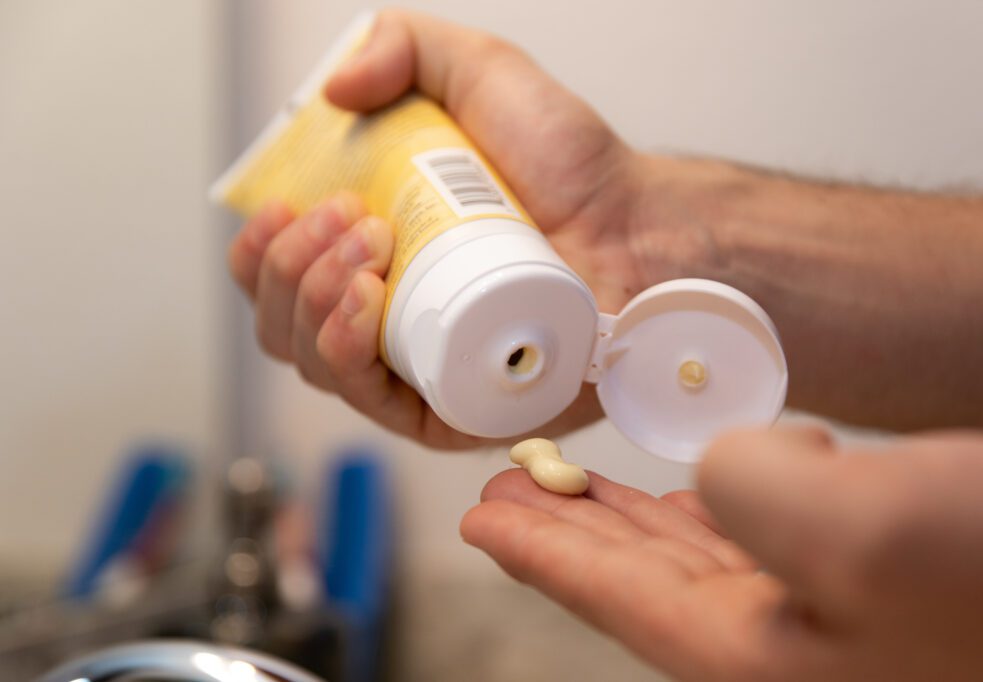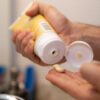Acne impacts as many as 50 million Americans annually, and many rely on over-the-counter or prescription treatments containing benzoyl peroxide to control breakouts. First introduced in 1934, benzoyl peroxide (BPO) remains one of the most widely used and clinically proven acne-fighting ingredients. It works by killing bacteria, reducing inflammation, drying excess oil, and helping to clear clogged pores. Available in multiple strengths and formulations, it can be found in creams, gels, soaps, and facial washes.
However, in March 2025, the U.S. Food and Drug Administration (FDA) announced that it had tested 95 (BPO) acne products for benzene, a known carcinogen. While the majority, over 90 percent, had either undetectable or very low levels of benzene, six products were found to contain elevated amounts. They were recommended for recall at the retail level.
Despite this recall announcement, the FDA emphasized “the risk of a person developing cancer because of exposure to benzene found in these products is very low.”
In response to the FDA’s findings, retailers voluntarily agreed to remove the affected products from store shelves and online. Although the FDA did not specifically instruct consumers to return these items, it advised through an official press release and public statements that consumers should check product labels and discard any recalled or expired products.
The FDA recall includes the following over-the-counter BPO products:
- Proactiv Emergency Blemish Relief Cream Benzoyl Peroxide 5% (lot numbers V3305A, V3304A, exp. October 2025)
- Proactiv Skin Smoothing Exfoliator (lot number V4204A, exp. July 2025)
- SLMD Benzoyl Peroxide Acne Lotion (lot number 2430600, exp. March 2025)
- Walgreens Acne Control Cleanser (lot number 23 09328, exp. September 2025)
- Walgreens Tinted Acne Treatment Cream (lot number 49707430, exp. March 2026)
The manufacturer of Zapzyt Acne Treatment Gel also voluntarily recalled its product after its own testing revealed elevated benzene levels. The recalled batch carried an expiration date of April 2025, marking the end of the period during which the manufacturer guarantees the product’s safety and effectiveness. Notably, several other affected products are nearing their expiration dates, and two — SLMD Benzoyl Peroxide Acne Lotion and La Roche-Posay Effaclar Duo Dual Action Acne Treatment (lot number MYX46W) — have already expired.
It’s worth noting that the recalls followed third-party test results that raised concerns about benzene levels in a wide range of over-the-counter and prescription acne products.
Independent Lab Sparks Investigation Into Benzoyl Peroxide Safety
In a March 2024 study published in Environmental Health Perspectives, the independent laboratory Valisure — whose previous investigations had uncovered benzene contamination in consumer health products such as sunscreens, hand sanitizers, and antiperspirants — reported that some BPO acne products, when heated, could generate more than 800 times the FDA’s “conditionally restricted” concentration limit for benzene, which is 2 parts per million (ppm) for most drug products. Valisure petitioned the FDA to recall these BPO-containing products from the market, citing concerns about benzene formation, particularly when products are exposed to heat during storage or transportation
About seven months later, Valisure published a new study in the Journal of Investigative Dermatology stating that 34% of 111 BPO products purchased from major U.S. retailers contained benzene at “unacceptably high levels” even when tested at room temperature. “I was shocked at the magnitude of the instability of benzoyl peroxide,” said David Light, co-founder and president of Valisure.
In response to Valisure’s papers and petition, the FDA conducted its own investigation. While the agency found fewer contaminated products than Valisure reported, it emphasized that its results were based on validated testing methods — standardized scientific procedures designed to deliver consistent and reliable outcomes. The FDA also cautioned that “third-party laboratories may use unvalidated testing methods, which produce artificially high levels of reported contaminants like benzene.”
Valisure stood by its findings, asserting that its testing methods are both accurate and credible. The company also noted that, as an independent lab unaffiliated with drug manufacturers, it operates outside the FDA’s current Good Manufacturing Practice (cGMP) framework. Instead, Valisure adheres to ISO/IEC 17025:2017 standards, an internationally recognized accreditation for analytical laboratories.
The agency says it is continuing to monitor the safety of BPO products and plans to publish full details of its testing methods, including data and methodologies, in one or more peer-reviewed journals in the coming months.
What is Benzene, and Why Is It a Concern?
Benzene is a colorless, or sometimes light yellow, flammable chemical found in crude oil, gasoline, and cigarette smoke. It is used in manufacturing plastics, resins, dyes, pesticides, and other materials. The Environmental Protection Agency (EPA) and the International Agency for Research on Cancer (IARC) classify benzene as a carcinogen due to its established link to leukemia, lymphoma, and other forms of cancers.
Although benzene is not intentionally added to skin care products, ”the more heat benzoyl peroxide is exposed to—potentially even at room temperatures or on store shelves—the more likely it is to break down and form benzene,” says Valisure’s Light.
This concern about benzene is significant because of its known health risks. According to the Centers for Disease Control and Prevention (CDC), long-term exposure, particularly to high levels of the chemical in occupational settings, can increase the risk of blood cancers and harm the immune and nervous systems. While most research on benzene risk focuses on inhalation in industrial settings, a few laboratory studies have shown that even trace amounts of benzene can penetrate the skin barrier.
Kurunthachalam Kannan, Ph.D., an environmental chemist at the University at Albany, notes that between 1% and 10% of a product can be absorbed through the skin, depending on the formula and factors like skin moisture. Because the extent of individual exposure to benzene remains uncertain, he says, “if benzene is a consideration, I would definitely consider an alternative acne product.”
Is Benzoyl Peroxide Safe to Use? Experts Weigh In
The recent recalls have intensified scrutiny among dermatologists and other health experts, particularly given that cumulative exposure, especially among acne-prone teens and young adults who may apply BPO daily in warm, steamy bathrooms, could accelerate its breakdown into benzene. “Even if a product is clean when purchased, it can form high levels of benzene over time, even sitting in a medicine cabinet,” says Light.
While some clinicians urge caution, others continue to stress its value in acne treatment.
How To Check If a Product Contains Benzene
One of the biggest challenges for consumers is that benzene contamination isn’t visible and doesn’t appear on product labels, which makes it difficult to identify without official testing or recall information. If you are concerned about benzene contamination, you can:
Check the FDA’s recalls, market withdrawals, and safety alerts list for updates related to BPO products.
Use third-party databases, such as the Environmental Working Group’s Skin Deep® Cosmetics Database, to look up safety profiles for personal care products.
Joshua Zeichner, M.D., director of cosmetic and clinical research in dermatology at Mount Sinai Hospital in New York City, emphasizes a balanced view: “The use of any medication on the skin is a risk-benefit ratio,” he says. “But no causal relationship has been identified between the use of benzoyl peroxide in acne patients and the development of blood cancers. The decision has to be made between you and your doctor whether the benefit outweighs the risk.”
Dr. Zeichner says patients shouldn’t panic if they are using one of the recalled products or a product containing BPO since it is “perhaps the best ingredient we have to treat acne.”
Adding support to Dr. Zeichner’s position, researchers from the University of Texas Medical Branch analyzed population-based data from the TriNetX U.S. Collaborative Network and reported in the Journal of the American Academy of Dermatology that they found “no significant association between benzoyl peroxide exposure in patients with acne and increased risk of malignancy.”
By contrast, Christopher Bunick, M.D., Ph.D., Associate Professor of Dermatology at Yale School of Medicine, warns, “There is not a safe level of benzene that can exist in any skin care product, over-the-counter or prescription.”
Choosing the Right Acne Treatment for You
Acne most commonly begins in puberty, but it can persist into adulthood or develop for the first time in a person’s 30s or 40s. Because acne can take many forms — including blackheads, whiteheads, pimples, pustules, nodules, or cysts — there’s no one-size-fits-all solution.
“Every patient is different,” says New York dermatologist Eugene Zappi, M.D., a clinical assistant professor in the Ronald O. Perelman Department of Dermatology at NYU Grossman School of Medicine. “There are many products at the store to treat mild to moderate acne, as well as prescription medications for more severe cases or when over-the-counter options aren’t effective.”
The American Academy of Dermatology (AAD) recommends working with a board-certified dermatologist to identify the best treatment based on your skin type and acne severity.
If you choose to use a BPO product, here are several safety tips from Dr. Zeichner to help ensure its effectiveness:
- Pay attention to expiration dates. Discard any product that has expired.
- Store it properly in a cool, dry place. Avoid heat and humidity, which can accelerate breakdown.
- Apply it at night to avoid UV light exposure, which can destabilize the ingredient.
- Check for changes in appearance or smell. If the product looks, feels, or smells different than when you purchased it, it may have degraded and should be thrown out.
- Use it sparingly. Some dermatologists, including Dr. Zappi, prefer to use BPO on targeted areas to minimize irritation and improve results.
Over-the-Counter Acne Treatments
If you are concerned about using acne products containing BPO, there are a number of over-the-counter alternatives to consider:
- Adapalene (brand name Differin): The first non-prescription topical retinoid that helps unclog pores and prevent pimples.
- Azelaic Acid (brand names Azelex, Finevin): Sold OTC and in stronger concentrations via prescription, it is an antibacterial and used for mildly to moderately inflamed acne. It is a naturally occurring saturated dicarboxylic acid found in wheat, rye, and barley, and is also produced by a yeast on the skin.
- Salicylic Acid (brand names Akurza, Clearasil Total Control, others): A beta hydroxy acid derived from willow bark and wintergreen that treats and prevents acne, and helps unclog pores.
- Gentle Cleansing: Washing with fragrance-free soap and water or a mild acne-fighting face wash no more than twice a day can help remove surface dirt and oil — but it won’t clear existing breakouts.
In a recent Valisure study of 76 acne treatment products that did not contain BPO, nearly all showed no detectable levels of benzene.
Prescription Options
When over-the-counter treatments prove ineffective after two to three months — or for more severe cases — prescription options may be needed. According to John Barbieri, M.D., MBA, director of the Advanced Acne Therapeutics Clinic at Brigham and Women’s Hospital in Massachusetts, one recent development is a fixed-dose combination therapy that includes clindamycin (an antibiotic), adapalene (a retinoid), and BPO.
Clinical trials have shown that this combination, now available as a prescription topical treatment, helped more than half of patients achieve clear or nearly clear skin within 12 weeks of daily use.
Natural Treatments
For those seeking alternatives to conventional chemical-based treatments, several natural remedies have shown potential benefits. While evidence for their effectiveness is more limited, a 2022 review published in Evidence-Based Complementary and Alternative Medicine, concluded “medicinal plants and phytochemicals are promising treatments for mild to moderate acne vulgaris.”
Options include:
- Aloe Vera: Research suggests that aloe vera has a variety of “anti-inflammatory, anti-oxidative, and anti-pigmentation effects, beneficial for acne treatment and repair of skin lesions.”
- Tea Tree Oil: A 2023 review in Frontiers in Pharmacology found that a 5% tea tree geil-based topical gel may help reduce lesion count and acne severity.
- Honey: An older study in the Asian Pacific Journal of Tropical Biomedicine found that raw or unfiltered honey may help reduce redness, swelling, and inflammation due to its antimicrobial, anti-inflammatory and wound-healing properties.
- Witch Hazel: A 2024 study in the Journal of Cosmetic Dermatology found that extracts showed promising anti-inflammatory effects in cell cultures and skin tissue. It may reduce redness and irritation for mild breakouts.
- Clay Masks: Studies have shown that clay masks with kaolin and bentonite can reduce surface oil and breakouts.
While BPO remains a mainstay in acne treatment, recent recalls underscore the need for informed use and proper storage. Talk with your dermatologist to find the right solution for your skin, and stay up to date on product alerts.






